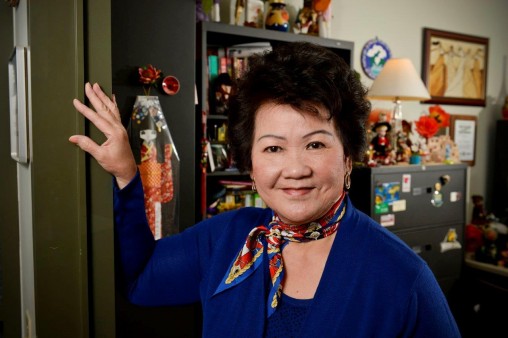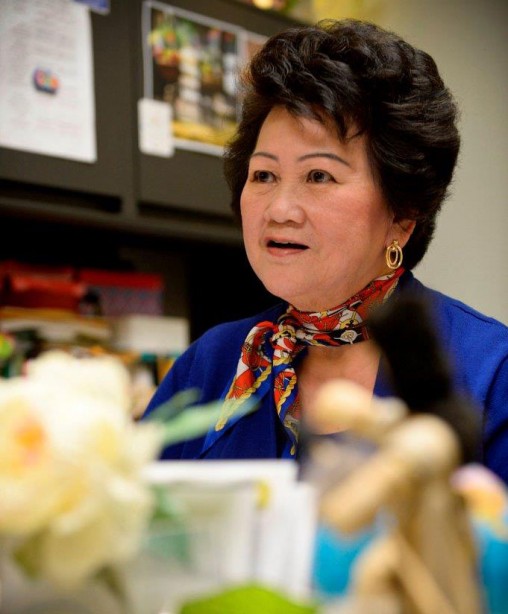
Mai Nguyen, director of the Asian/Hispanic/Native American Center, is among the Dayton-area Vietnamese Americans featured in “Between Two Worlds,” a documentary produced by ThinkTV. Nguyen left Vietnam in 1974 to attend college in America.
She left her native Vietnam in 1974 to attend college in America, narrowly escaping the bloody Communist takeover of her homeland. It would be a quarter century until Mai Nguyen would return.
When she did, her beautiful, raven-haired mother — a celebrated broadcast journalist — was a white-haired wisp of her former self. Nguyen realized that the war and its aftermath had stolen 25 years from the two of them.
“It was extremely emotional,” Nguyen said of the reunion. “I broke down. I just cried and cried with her.”
Nguyen’s story is among those of Dayton-area Vietnamese Americans featured in “Between Two Worlds,” a documentary that will air on ThinkTV.
The idea and desire to develop the film was that of Nguyen — founding director of Wright State University’s Asian/Hispanic/Native American Center — and produced in partnership with the PBS affiliate.
In the film, the Vietnamese immigrants tell what it was like to make the painful decision to leave their homes in Vietnam, survive the rigors and dangers of the journey and overcome the challenges of making a new life in a strange land. The documentary will be broadcast just as the 40th anniversary of the fall of Saigon approaches.
The broadcast premiere of “Between Two Worlds” will be shown from 9 to 9:30 p.m. on Friday, April 24. It will be rebroadcast in an encore presentation Tuesday, April 28, from 11 to 11:30 p.m., following the premiere of Rory Kennedy’s Academy Award-nominated “Last Days in Vietnam.”
ThinkTV (WPTD channel 16 in Dayton and WPTO channel 14 in Oxford) is a service of Public Media Connect (PMC), a regional public media partnership with CET in Cincinnati.
Nguyen grew up in Saigon and was raised in a middle-class family. Her father worked for South Vietnam’s Department of Interior and her mother was a well-known broadcast journalist and newspaper editor.
Nguyen was largely shielded from the fighting between North and South Vietnam, but many of her friends were affected. Trips by them into the countryside sometimes resulted in them being ambushed, robbed and stripped of identification papers by the Communists. Her friends’ loyalty would then come under suspicion by South Vietnamese officials.
Nguyen arrived in the United States in 1974 to attend Syracuse University, where she would go on to get her bachelor’s degree in English. She watched the fall of South Vietnam from her dorm room at Syracuse, hanging on every word from “CBS Evening News” anchor Walter Cronkite.
“It was heartbreaking to see one city after another collapse,” she recalled.

Mai Nguyen began working at Wright State as a research assistant in Academic Affairs in 1986 and founded the Asian/Hispanic/Native American Center in 1997.
Saigon fell to the Communists on April 30, 1975, resulting in a mass exodus of South Vietnamese. Nguyen worried about her mother, who elected to stay.
“I was so panicked because I couldn’t get in touch with her,” Nguyen said.
The fall of Saigon marked the end of the Vietnam War and the beginning of the reunification of Vietnam into a socialist republic governed by the Communist Party. It was preceded by the evacuation of tens of thousands of South Vietnamese civilians associated with the southern regime.
After the fall of Saigon, Communist soldiers would often search the house of Nguyen’s mother at night to see if any South Vietnamese soldiers were hiding there.
“She was so afraid,” Nguyen said. “But she never wanted to leave Vietnam.”
The number of boat people who left Vietnam and arrived safely in another country totaled almost 800,000 between 1975 and 1995. Many of the refugees failed to survive the passage, facing danger and hardship from pirates, overcrowded boats and storms.
Nguyen’s plan was to return to Vietnam to teach. But her mother cautioned that with the Communists in control, it was just too dangerous for her to come back.
In 1982, Nguyen moved from New York to Ohio after her husband got a job teaching economics at Wright State. She earned master’s degrees at Wright State in industrial management counseling and student personnel in higher education.
In 1986, she began working at Wright State as a research assistant in Academic Affairs and in 1997 became the founding director of the Asian/Hispanic/Native American Center.
Nguyen came up with the idea for the documentary film to educate the public about Asian Americans and their history. She was supported by Kimberly Barrett, Wright State’s vice president for multicultural affairs and community engagement.
“I needed to do something because a generation of Americans doesn’t know about the Vietnam War,” Nguyen said. “We needed to do a film to document the challenges that Vietnamese immigrants encountered when they first left Vietnam. I have yet to see a documentary that tells those stories. They kind of forgot those people who arrived here.”
So she approached ThinkTV and worked with producer Richard Wonderling as well as Kitty Lensman and Gary Greenberg.
“What I was looking for was a documentary that would tell the untold stories of immigrants right here in our own backyard,” Nguyen said.
The immigrants were identified by Nguyen, who lives in and “knows everyone” in the Vietnamese community. Those interviewed range from government workers airlifted out of Vietnam to poor farmers who took their chances on leaky boats. One became a pediatric surgeon. One owns an engineering company. Others became business and property owners.
“Their stories are both harrowing and heartwarming,” said David Fogarty, president and CEO of ThinkTV.
ThinkTV has been producing programs about the history, people and culture of greater Dayton for many years. Plans for additional local programs are under way.
Between Two Worlds was produced in conjunction with the PBS Stories of Service initiative. The project was developed to tell the stories of U.S. military veterans, their families and communities affected by war.
The title of the documentary comes from the feeling among Vietnamese immigrants that they are still living in two different worlds.
“They love Vietnam, but they also love America, which gave them a second home,” Nguyen said.
She says that in order to understand any ethnic population, it helps to know why they came to America.
“I think the film will educate people,” she said. “Americans are compassionate people. They want to know what happened to those who made it here. I know the Vietnamese community is very grateful.”
Nguyen has seen some of the finished documentary.
“It’s really powerful,” she said. “I was reliving the experience 40 years ago. It was so real, I had tears in my eyes.”

 Wright State, Premier Health hosting surgical symposium for high school and undergraduate students
Wright State, Premier Health hosting surgical symposium for high school and undergraduate students  Wright State joins nation in celebrating first-generation students
Wright State joins nation in celebrating first-generation students  Education grant connects Wright State students with Dayton Regional STEM School for instructional education partnership
Education grant connects Wright State students with Dayton Regional STEM School for instructional education partnership  Wright State recognized among top public universities in latest U.S. News Best Colleges Rankings
Wright State recognized among top public universities in latest U.S. News Best Colleges Rankings  Nearly 1,000 students and alumni turn out for Wright State’s Fall Career and Internship Fair
Nearly 1,000 students and alumni turn out for Wright State’s Fall Career and Internship Fair 